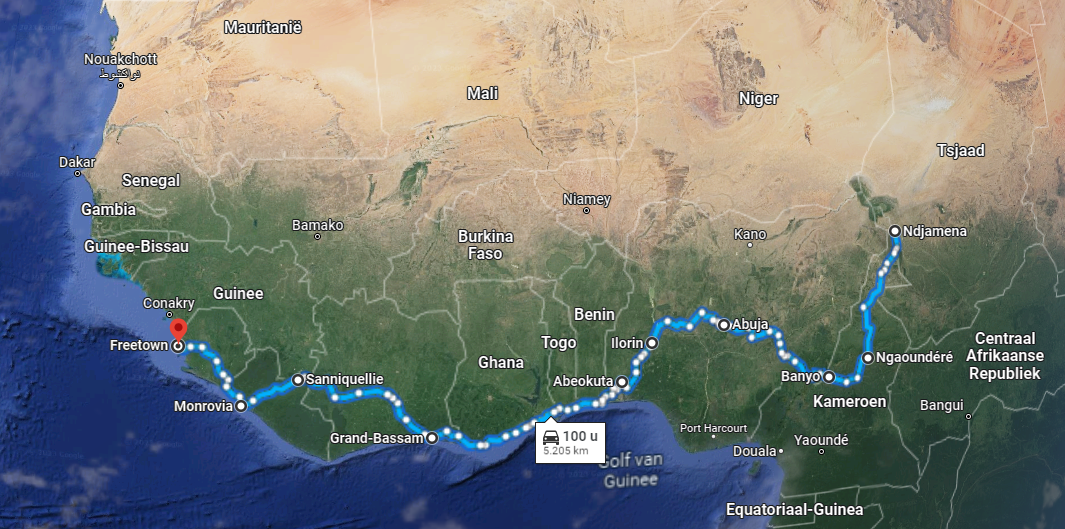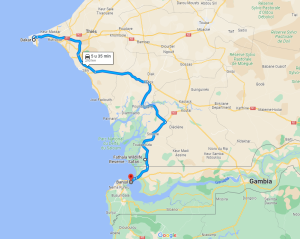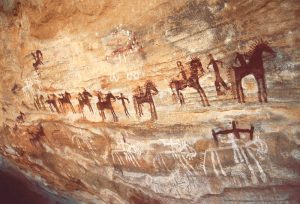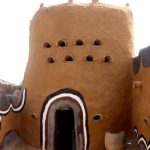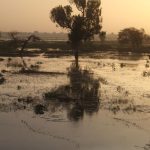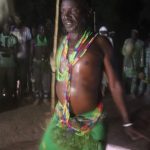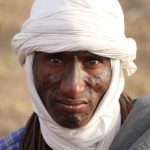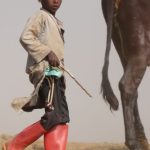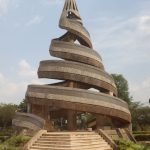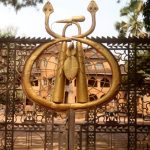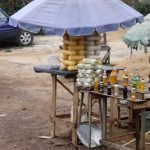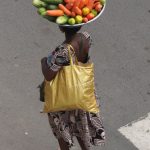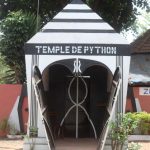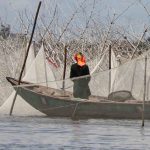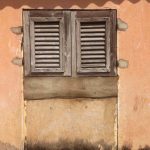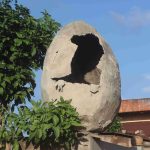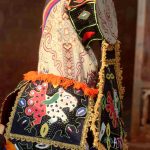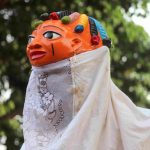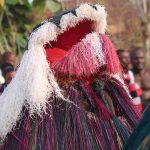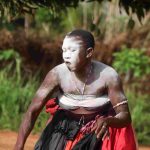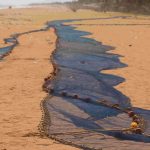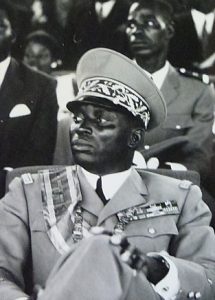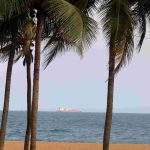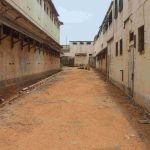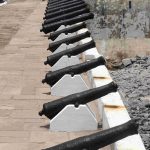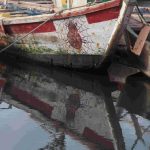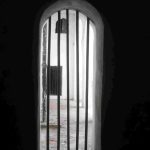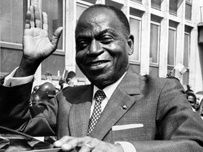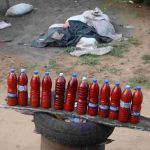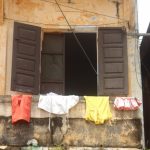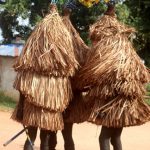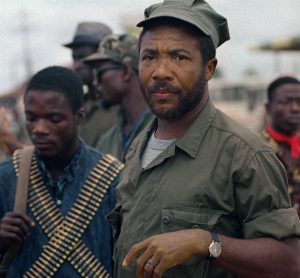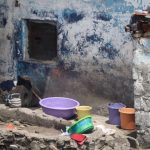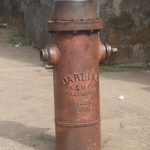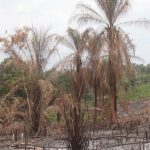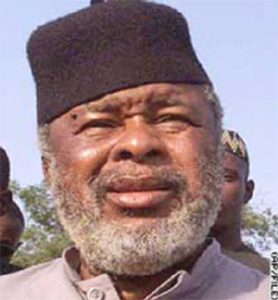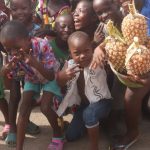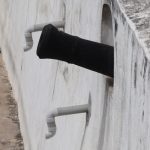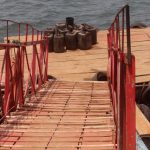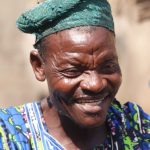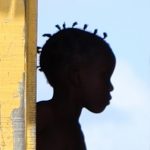Sometimes we do things, initiate initiatives and go to places that even I think are too silly to be true, let alone sensible. But we have done them, initiated them, and now there is no way back. Here I will write, from time to time, the story of the West Africa Expedition, of which I have no idea yet how it will end. I know how it began, though. Read on!
How on earth did we get here?
It all started with an email. Kumakondo, a travel agency specialised in Africa journeys, announced that they were organising a ‘transit trip’ through parts of West Africa. Read more.
Alonso, who, I think, is the owner, the organiser, the guide, the driver and everything else you can think of at Kumakondo, responded quickly to my request, and sent me a more extensive brochure on the ‘transit trip’. In essence, the plan is to drive in 40 days with a truck from Chad to Sierra Leone, through Cameroun, Nigeria, Benin, Togo, Ghana, Cote d’Ivoire and Liberia. A little over 5000 km. With a small group of likeminded lunatics, max. ten pax. Read on.
16 Nov. 2022
I casually asked Sofia what she thought about her birthday present. “Which birthday present”? “The one I sent to you by email”. “Didn’t see anything”. “Well, have a look then!” And I didn’t think more about it; at the most I would be subjected to ridicule and mockery.
“I am in!”
So I did get a response, after all. Not exactly what I had expected, though! After all, Sofia is usually the brake on my wildest and most extreme travel ideas.
I brought up that the area where we are going is not the most stable in the world, lots of terrorist organisations, and so on. Read on.
We talked a bit more about the trip, and about the issues, especially the security points. We agreed we could look at this in two ways: if we join the trip, we assume that we have a responsible group leader, Alonso himself, who knows the area, but being a group makes us quite visible, and thus a potential target for kidnapping. If we travel alone, we are more nimble, move quicker, less obvious a target. On the other hand, if we don’t join the trip, we will never make this journey; others, yes, but across West Africa? Highly unlikely. Because we don’t have the local knowledge that you need for such a trip.
A look at the map with terrorist activities shows….. Read on.
29 Dec. 2022
And what you all have to do before leaving!
After having secured our place on the trip by paying a significant amount of money as a deposit, we took off to Argentina for visiting family and friends, and didn’t think much about the African adventure anymore. But now we are back, and we have to start working; there is a lot to do, in terms of visas, vaccinations and flights.
And we need to arrange our self-inflicted extension, too. Once at the end of the transit trip, the organised part, we are actually quite close to The Gambia, where we could recover from the hardship in one of the pleasant lodges the country is known for. And once in The Gambia, it is a relatively short haul to Dakar in Senegal, which I reckon is one of the most fascinating capitals of West Africa. And on the way to Dakar, we might as well spend a few days in a game reserve and get a short safari in.
Let’s first sort out the tickets. Not a big deal really, the ticket sites that normally work to find the cheapest tickets for your city break, they also work for tickets further afield. Read on.
We have done some visa research. First the good news: our self-inflicted extension of the trip, through The Gambia and Senegal, does not require visas for EU citizens. Read on.
Visa nr 1 – Chad – in the pocket, or rather, in the passport, visa nr 2 – Liberia – in progress. Read on.
We have made an appointment at the Travel Clinic, to get up to date on health issues in West Africa. We know about compulsory Yellow Fever vaccinations, we already needed to proof this for our visas, but how about malaria and other tropical diseases? Not to mention Ebola, a potentially deadly virus endemic to West Africa, and competing with kidnapping as the main risk during our trip. And monkeypox, another one originating from the same place? Read on.
We got nr. 2 – Liberia. Sofia went to Brussels, by train, to collect the visas. A good exercise in developing patience, which we no doubt will need during our expedition. Did I tell you already that we now refer not to our trip, anymore, but ‘the expedition’? Seems more appropriate. Read on.
Hmmm, ‘hitch-free’ not exactly (remember, OIS states on their website that they strive ‘to expedite hitch-free travel from the Netherlands to Nigeria’, see 21 Jan.). When we came to pay for the visas, we were told by OIS staff that, for the time being, the Nigerian Embassy in The Hague has decided not to issues tourist visas. This is the same embassy that, last week, provided me with the link to start the application process. On their website is nothing about this sudden change of mind, and other travellers in our group have obtained their visas – in other countries – without any problems. How to proceed further? ‘Call the embassy’, is the advice. Read on.
The visa saga continues. A week after our joint application submission to the Ghanese embassy, part online and part a whole stack of documents in support of our visas, Sofia gets a message that her application had been unlocked again. Would this be suggesting that she should edit one or more fields online, perhaps? And if so, which one(s)? The email didn’t specify. A telephone call the next day cleared that up: no need, and no worry, this is just an automatic message generated when the application process is being initiated at the embassy! Read on.
Without a Nigerian visa, we will have to find an alternative way to get from Cameroon to Benin. Perhaps we can, whilst the rest of our group continues into Nigeria, stay behind in Cameroon, spend a few days there visiting whatever is worthwhile, and then fly to Benin? Read on.
Our alternative plan, flying into Benin, means that we have to arrange a visa for Benin in advance. With the group, we would have obtained our visa on the way, maybe at the border, or in some other way, not yet specified, but now we are on our own.
So I brace myself again, for the next ordeal. Read on.
With all the mundane preparations behind us – well, we still have to pack our bags, but that comes later -, it is time to focus on the contents, so to speak. I usually start by digging into the history of the country in some detail, but in this case that is not going to work. We’ll be visiting ten countries – excluding Nigeria – in eight weeks! Perhaps a regional approach works better, not in the least because all these countries’ histories are intimately linked. Read on.
Somehow, things changed in 1879, the year France decided on an expansion policy in Senegal. With the abolishment of the slave trade another economic model had to be developed, and in this case is was groundnuts. But these grew in the African interior, outside the immediate control of the French. Where earlier some French citizens occupied a number of trading ports along the coast, in 1879 the official policy changed towards full scale colonialisation; and it was subsequently left to the military men to arrange this. Read on.
A bit about Chad
Less than a week to go, and the excitement is growing by the day. Packed the backpacks, unpacked them again, and then repacked them. We haven’t forgotten anything, mosquito nets, suncream, hat, flip-flops, swimsuit. And that whilst it is freezing, here, at night. Good feeling.
Let’s focus on where we are going to first, Chad. Read on.
We are woken up by the muezzins, many of them. Chad is predominantly Muslim, and Ndjamena obviously has lots of mosques, all of which call the faithful to prayer. All at the same time. Five AM. Half an hour later the church bell rings: we are staying in the Catholic Mission, in the centre of town. Breakfast is at six. Hmm, we will have to adjust our rhythm. But in fairness, early morning is the best part of the day, it is nice and cool. Later, it turns to 40o C. Read on.
We got our Cameroonian visa yesterday, within a day. Apparently the Embassy in Ndjamena is quite willing to oblige, for a cool EUR 250 per person. The only hiccup was that there was no electricity for a while, and the visa stamps couldn’t be printed. Read on.
The Gaoui Palace
As we have another day in Ndjamena, a city where – according to Alonso – there is absolutely nothing to do, we arrange a taxi to go and visit the Gaoui Palace, 10 kilometres outside town. On the way we pass a few more aspects of Ndjamena. On the outskirts are several ministries, and the National Assembly, of – let’s say – variable attractivity. Read on.
The real expedition has started, we are off!
We have left. For real. This morning a wakeup call at 5 am, breakfast, packing the truck, and off we go at 6 am sharp. The plan, suitably vague, for the next few days – two, or maybe three, equally vague – is to visit some villages in the south of Chad, including nomads, and including some local ceremonies. Read more.
Actually, after we had dinner yesterday – accompanied by a Gina band, a singer/player on a kind of a guitar and a duo of percussionists hitting a shifting washing basin -, we went into the village, Djodo Gasa, attracted by more music. The people here are Moussay, a local tribe with a strong cultural heritage, which is being preserved in the dancing ceremonies. Read more.
We still have a long way to go today. The plan is to camp near the town of Mondou, the second largest town of Chad, in an area where the Fulani nomads converge at this time of the year. But first we look around at the village where we camped – last night, I hadn’t noticed that there actually was a village. Read more.
The nomads we camp in between are Fulani people, herders that surround the edge of the Sahel. There are several groups, with different names, in Chad, some of which manage to travel over 700 km a year, from north to south, where the water is in the dry season, back up north again. They travel with everything they have, which is not much, as we saw yesterday. And with their cattle, of course. Read more
The trade-off from yesterday’s early stop is that today we have an early start, leaving at 5.30. It is still dark, and the electricity in the hotel has gone off during the night – the ceiling fan, too. We pack our bags without light, except for the small torch I am carrying. It is too early for breakfast. Did we voluntarily sign…, ah, never mind. Read on.
A little background on Cameroon
Time to zoom out a little, and look at Cameroon’s history. As observed earlier in this diary, the Germans beat the British in colonizing Cameroon. They swiftly took on the improvement of infrastructure, including the building of a railway – the one we used, from Ngaoundere, for instance -, but their use of forced labour didn’t make them all that popular. So few Cameroonians shed a tear, when Germany was forced out after the First World War. Read on.
We wake up in a different world. Well, in fact, we woke up many times, last night, each time the train pulled into the next station, blowing its horn without any consideration for its passengers. But you easily fall asleep again on the rhythm of wheels on the tracks. With first light, looking outside, the dry savannah from the last week has gone, and verdant green jungle surrounds the train on both sides. Parts have been chopped down for agriculture, mostly bananas and papayas. Read on.
The Bamileke
Mayou has organised another car for today, to take us to the west of the country, the Bamileke area. The Bamileke are a tribe that migrated into their present area in Western Cameroon from further Northeast. They have a well organised societal structure, which appealed to the British colonisers who handed them a certain amount of control. Along the road we see many signs to chefferies, these the houses of the village chiefs, or kings. Read on.
Foumban
There is more than just Bamileke in the west of Cameroon. We make our way from Bafoussam, the regional centre where we spent the night, to the town of Foumban, further to the north. Even though it is only 70 km, the effect of ‘north’ becomes quickly visible, in an increasing number of mosques, many charming and small again, like we saw earlier in Chad. Where the kingdoms around Bafoussam are perhaps predominantly Christian, Foumban is mostly Muslim – although everybody is at pains to stress that Christians and Muslims happily live together here. Read on.
We are on our own now. Mayou left yesterday, as we reckoned that we are travel-savvie enough to take the bus to Douala on our own, and spend our last days in Cameroon there. Are we? I have reserved tickets for the 8 am bus. The lady next to the hotel, who provides breakfast, didn’t turn up, so we leave for the bus station at 7.15, to have our now familiar omelette and baguette there. The bus is ready, and the omelette takes ages, so we get a bit nervous. Silly we. Read on.
The good news yesterday, at the bus station, was that we got picked up by our hotel van. No need to battle with taxi and moto drivers to negotiate a fare. We have treated ourselves to slightly more upmarket accommodation, in fact way up from the Catholic missions, tents and basic hotels so far. Pool on the roof, gin-tonic in the bar and AC in the room. And a hotel shuttle van. Read on about Douala.
A background intermezzo on Benin
As we are travelling today, perhaps a good moment to look into the history of Benin, before we land there. The present-day country of Benin – not to be confused with the ancient Kingdom of Benin, which is located inside Nigeria – attracted early attention from the Portuguese, who, after having built Fort Elmira in Ghana, expanded along the coast to establish trade relations with cities like Ouidah and Porto Novo. Read on.
Yesterday we got to Douala airport, checked in for our Air Senegal flight, and got to Cotonou, Benin’s commercial capital. All very civilised. Whizzed through custom, took an airconditioned taxi to our little hotel on the beach, and, eh, then we didn’t do much anymore, except consuming. This is quickly turning into a comfortable beach holiday! Read on, about Ouidah.
Ganvie
Ouidah was something of a tourist trap, everybody agrees. And thus we are heading for the second tourist trap in this country, Ganvie. Do we never learn? Read on.
Porto Novo
With pain in the heart we leave our little beach hotel behind – which was actually more like a hotel close to the beach, a beach too filthy to sit on, and the sea too filthy to bathe in, just next to the Cotonou harbour entrance. But it was a very comfortable place, nevertheless, with good food, cold drinks and pleasant people.
Our next destination is Porto Novo, Benin’s rather humble capital city. Read on.
We’ve got a problem. We have no money. Well, we have plenty of US$ and Euros, but we haven’t got West African Francs anymore. And in Porto Novo, the capital of Benin, for crying out loud, it turns out not to be that easy to change. The concept of going into a bank, offering foreign currency and receiving local money in return is alien, it seems; the first two banks we enter don’t do this kind of strange transactions. Read on.
We are still in Porto Novo, and we haven’t seen the only museum that is open, yet. So after a baguette with omelette and a dubious instant coffee in one of the street stalls around the corner of our guesthouse, we head to the Honme museum, the former royal palace of the rulers of the Hogbonu kingdom. This was an small kingdom, sandwiched in between the powerful Dahomey who covered most of present-day Benin and the various kingdoms in what is now Nigeria. The best-known from this dynasty was King Toffa – whose statue also dominates the central square. Read on.
Although Porto Novo kept on surprising us, and no doubt has more undiscovered potential left, we decided yesterday to return to our beach hotel in Cotonou. The initial plan was to travel on to Ketou, where we would link up with the truck again, but then the truck decided to go south, and spend another two days in Nigeria. And if we have to wait anyhow, we might as well do this is the relative comfort of our familiar breezy balcony. Read on.
All went well. We met up with the our travel group and the truck around lunchtime, which we celebrated without food, but with lots of beer. And then we climbed onto the truck again, and all was as before. Except that the group seemed rather exhausted – especially compared to our pretty relaxed last few weeks. Read on.
If we ever were curious about the landscape inland Benin, we have now satisfied our curiosity. It is pretty boring. Lots of green, lots of palm trees – for palm oil industry, presumably, no coconuts. And dusty villages, square brick or adobe houses with the inevitable corrugated iron on the roof. And thatch, suggesting greater poverty, again. Interestingly, we also see the occasional mosque, the small, charming type, several larger churches, and Voodoo temples and little Voodoo shrines, apparently happily living next to each other. Read on.
We check out of the hotel early, today. There is quite a bit of driving to do. And then we spend an hour arranging sim cards for those who don’t have one yet. Could we have done this more efficiently, perhaps? But it gives my travel companion an hour time to say goodbye to all the local staff of the hotel, who, within 24 hours, all know her by name – although it is fair to say that quite a few other female group members were also addressed with ‘Sofia’, after all we all look the same. Read on.
One more Voodoo dance to go. Close to where we camped, still in Bopa, we stop – we could have walked – for another dance, the Gambada. This is a love dance: if a couple have issues, or if a boy fancies a girl, or the other way around, he or she can turn to the priest for help, who will then invoke the spirits in a ceremony, these will help solve the problem. Read on.
Having enjoyed the surf – very strong undercurrent, no swimming in the sea here – and the pool, and the excellent restaurant of our beach hotel, there is not much more to do in Grand Popo. I take a walk along the beach, where fishermen are hauling in a huge net. As everywhere in Benin, I am several times requested to pay for taking photos, which I politely, and with a big laugh, decline – which is then also OK. A little further some fishing boats are anchored offshore, others have been pulled up the beach. Potentially colourful, but many of the boats are old and decrepit. Fishing nets are drying everywhere. Read on.
Seven of us, out of the group of twelve paying passengers, leave for the ten minutes’ drive to the border. Where our visa saga, already a subject of this diary before, continues. The Benin and Togo border officials share an office, to encourage efficiency, no doubt. Read on.
A little on Togo and its history.
There is very little pre-colonial history of Togo, which was really not much more than a buffer between the Ashante and Dahomey empires, in Ghana and present-day Benin, respectively. In the days of the slave trade it was held by the Danes, and in 1884, through a treaty with a little village chief, it became a German colony. Read on.
Lomé
From the moment we drive into Togo there is a different vibe. People are actually working, on the building sites. Lots of factories seem to produce all sorts of things, there is an oil refinery, the port is busy – but I never know whether a large amount of ships anchored offshore is a good sign, or bad, meaning that handling speed is far too low. Read on.
The overcast sky of yesterday decided to empty itself early morning, today, and the potholes in the streets have filled with water, leaving large, unpredictably deep puddles. The lesser streets, unsurfaced, are muddy, miserable. We find a ‘boulangerie’ with croissants and pain au chocolat, for a special treat breakfast, and afterwards we reunite with the rest of the group, again, who left early from Grand Popo. Read on.
Another short intermezzo, this time on Ghana’s history.
Although the Kingdom of Ghana, one of the early West African empires, was located well north of what was known as the Gold Coast in the colonial era, and had succumbed to its enemies already in the 12th C, the new rulers adopted Ghana as a more suitable name for their country than Gold Coast, upon independence in 1957. Read on.
Accra
At breakfast we find out that Ghana was a British colony. Eggs, sausage and beans, on toast. Gone are the delicious baguettes of former French colonies! Read on.
We are on our way to Elmina, the place where the Portuguese were the first Europeans to build a stronghold on the African coast, in 1482. But first we need to get out of Accra, which is quite an effort. The town is equally extensive on the northern side, and several road diversions don’t help with progress. In the suburbs we are – not for the first time – confronted with the religious fervour of many Ghanaians, especially in any of the many Christians sects. Read on.
Elmina
As it is too late to enter the Elmina castle now, we take a stroll into town in the late afternoon. Lots of activity, even on a Sunday. The boat builders, for instance, continue, putting the hulls together of several impressive fishing boats. Others are drying fish, on large metal-and-wood racks, creating a nauseating mixed smell of burned wood and fish. This must be an enormous industry, given the amount of racks, the wood and the large sacks that obviously have been filled already. Read on.
We check out the fish market first thing in the morning, the same place where the fish was landed yesterday evening. This is a great place, absolutely full of people, and of many different types of fish. On one side are the big fishes, many Yellow-fin tuna – I think, judging from the yellow fins. And some enormous flat fishes, the occasional small shark, and more fish I don’t know the name of. And I cannot take pictures of to look it up later, of course, because everybody is the usual paranoid about photos. One man explains to me why, he says that we take pictures of Africans so that we later can laugh about them. Yeah, well, that is difficult to argue with, perception is reality. Read on.
A little on Cote d’Ivoire’s history.
In the years preceding the arrival of Europeans the territory of Cote d’Ivoire consisted of an assembly of relatively small kingdoms, in the shade of the larger Ghana, Songhai and Mali empires to the north. Several ‘immigrant’ groups existed, like groups fleeing the Asante in neighbouring Gambia and Muslim people moving south from Mali empire. None of those achieved long term dominance, which made it not too difficult for the French to establish a foothold along the coast, firstly for a missionary post in Assinie. Read on.
Today is really a transit day. We leave early from Elmina, and make our way to the border with Cote d’Ivoire, a pretty unremarkable drive. At one stage we cross a river, with next to us what looks like an old railway bridge. And for the rest, along the road lots of activity, people selling all kind of stuff. Villages spilling over on the road, busy. Read on.
Grand Bassam
We have another day off, because some of us still need to arrange a Liberian visa, in nearby Abidjan. Which will take at least one day, and possibly two. We decide to explore Grand Bassam, after the long day yesterday, and leave a day in Abidjan for tomorrow, if we do get another day. In any case, it is far too hot and humid for serious effort. Read on.
Everybody got their visas, so no extra day in Grand Bassam, and no day excursion to Abidjan. A pity, in a way – missed opportunity – but on the other hand most African cities so far haven’t impressed very much (although Abidjan may have had the capacity to do so, a bit more: green, clean and attractive modern architecture, so they say). Instead, we pick up the transit mode again, making miles on the way to our final destination. Read on.
Just after I wrote yesterday’s conclusion, that we are from now on just transiting, Alonso spots a few youths along the road, in traditional dress. We stop at the next village, called Zoukougbeu, to inquire, and indeed, they are part of an initiation group of 40, that spends some seven months in the forest. To become a man – girls are excluded, of course. The boys are between 18 and 25 years old, an initiation rite is only held every five years; but the most striking thing, as far as I am concerned, is that these things still happen, in this modern era. Read on.
Some Liberia history
Not much is known about the early history of what is now Liberia, located at the fringes of the great West African empires further inland, like the early Ghana, Mali and Songhai empires. As always, it was the Portuguese who were the first Western power to arrive, in 1462; they called the coast the Pepper Coast, or the Grain Coast (also referring to pepper grains), a commodity widely available and sought after by gourmet European cooks. The Dutch established a trading post in 1602, but left again 60 years later. The British arrived shortly after, also for trading purposes only, but – strangely – there is no knowledge of further settlements along this stretch of coast. Read on.
After having cleared the border yesterday, we had our first Liberia lesson. We slept in probably the worst, yet also the most overpriced hotel, of the trip so far, outside the town of Sanniquellie. Everything is ridiculously expensive, in Liberia. Not only hotels, a drink, a meal – they beat European prices, without ever coming close to European quality. Why, I have no idea, but the prices are the same for everybody, also the locals, most of whom must have great difficulty paying. Because daily life inside Liberia is not going to be hugely different from that inside Cote d’Ivoire, or inside Ghana, where prices were far more reasonable given the economy of these countries. Read on.
Monrovia
It is Easter Sunday. What better way to spend the morning at mass in the catholic? I see some of you frowning. I mean mass in an African cathedral, the Sacred Heart cathedral of Monrovia, and let me tell you, that is a whole different experience. Sure, we need to stand up regularly, more than during a usual service in a western country, but we do get something in return. There is a bit of gospel reading, but most of the time the choir is singing, or the whole congregation. And when they sing here, they swing. Not only the choir, but many people in the pews are moving their hips, waving their arms; very few people can stay sitting still. Read on.
Our second day in Monrovia. We check out the second-best tourist site, the equally derelict Edwin J. Roye building. This was the former headquarters of the True Whig Party, the political party that has dominated Liberian politics for over a hundred years, until the 1980 coup d’état. Perhaps the only skyscraper in town, built in the early 1960s, it became defunct after the coup, which did away with the party, and thus – that’s how things go, as we saw with the Ducor hotel – fell into disrepair, and quickly decayed further. You cannot go in (or so I thought), but from the outside it looks sad enough. Read on.
This trip is quickly bleeding to death. We already don’t refer to it as an expedition anymore, this is a walk in the park, with rather too many rest days. We are supposed to go to The Gambia afterwards, to recover from a strenuous journey, but by the time we arrive, we will be well rested. Read on.
Because of the visa delays we are behind schedule again. Thus, six o’clock departure, in the dark, and it wouldn’t surprise me if Alonso is going to push for arriving in Freetown tonight, usually a two-day trip.
Driving through Monrovia early morning, the rubbish everywhere is striking This entire city looks like a shanty town, it reminds me of the poorer parts of Port-au-Prince, in Haiti. We leave the town in northern direction, and the outskirts too, are chaotic and messy. Read on.
Sierra Leone intermezzo
The early history of Sierra Leone is unique: long before the Americans launched their idea of a colony for freed slaves, in Liberia, the British already shipped ‘black poor’, many of them slaves that had deserted to the British during the American War of Independence, to a colony purchased in Sierra Leone, called the Province of Freedom. The first such enterprise, in 1787, failed: 30% of the immigrants died in the first three months, the rest was evicted by the local king, and were ultimately absorbed in the local community. Read on.
Today is the last day on the truck. Yet, it is not different from other days, perhaps even worse; even fewer stops, the end is in sight. There is also no special anticipation in the truck, I have the feeling that everybody is fed up with driving, and looking forward to the end of it. Read on.
We need to change money. ATMs are no good, because the maximum they dispatch is the equivalent of 40 US$. Our cash dollars are good for local currency, the Leone, which confusingly comes in old and in new notes. We briefly feel ourselves a millionaire, with all these LE 10,000 notes, until we realise that these are the same as a new LE 10 note – which, incidentally, doesn’t look new at all anymore. LE 10 is worth about 5 cents – there are notes of LE 20, the highest denomination available, but they are elusive. A few hundred dollars in LE is a significant stack of money. I now understand why ATMs dispatch so little, a thicker pack simply doesn’t fit. Read on.
We had the idea of going to Bunce Island, a small island in the Sierra Leone river that empties in the ocean here. Bunce Island is the old British slave traders base, supposedly well protected, but demolished several times, by the French and by pirates. And now by the ravages of time, the place is completely in ruins. The tour guide we contact wants to have 200 US$ per person, to take us there; a one hour speed boat trip, perhaps an hour on the island, and an hour back. I find that a little steep for looking at some ruins, so we politely decline the offer. Read on.
And what about group travel, then, a new experience?
Our group travel experience has come to an end. In the past days we did bump into the occasional group members again, in the hotel or in town, but by now the group has quietly disintegrated, people go their own way, some have already left – without any formal closure, without saying goodbye. Strange, after having shared 40 days travelling together.
Perhaps a good moment to reflect on group travel. Read on.
Getting to the airport of Freetown is not that easy. You can go by road, some three hours’ drive all around the bay, but the shorter route is to take a ferry across the bay, to Tagrin, and from there a 20 minute taxi ride to the airport. Piece of cake? Hmmm. There are several ferries, at different times of the day. They claim to take flight departures into account, so the schedule varies accordingly. But how, that is not necessarily easy to find. Read on.
the Ngala Lodge
I am usually quite good at finding good accommodation, but this one beats all our expectations. The Ngala Lodge is a small – 24 rooms, no, 24 suites – hotel at the Atlantic Ocean front, with a fabulous garden, two swimming pools and a great view from the restaurant over that same ocean. Everywhere in the garden are cosy sitting areas, a pergola with comfy sofas or just a thatch parasol with two lounge chairs, to enjoy the breeze, to enjoy a book, or to slave away on this blog. Stairs lead down to the beach, which is clean, and where a wooden platform and curtains protect guests from the high tide and from the sun. Read on.
Of course, the initial idea was that we would need to recover from six weeks of hardship travel – the expedition – through West Africa, but by now you know, too, that that hardship was more about irritation over poor planning than that it had anything to do with tough conditions. When we reflect on the trip so far, we are both somewhat disappointed. Read on.
Having lingered in our comfortable lodge for a few days, it is time to undertake some activity again. We head for Tanji, a little further down the coast, to explore the bird reserve. Hmm. Long story short, we see more birds in our lodge than that we saw on our one hour walk through the reserve, which is mostly populated with shy baboons. We make it to the lagoon, which is somewhat better, bird-wise, but is also littered with the trash left by the fishermen – and the sad turtle who died tied up in net remains and rope. Read on.
Sofia is not well. In the past few days she did have occasional bouts of fever – nothing that couldn’t be cured, in the short term, with a gin-and-tonic -, but now the fever is getting higher, lasts longer, and has an obvious impact on the joie-de-vivre of my travel companion.
The hotel is going to mobilise a doctor, but when this takes too long, we get in a taxi and go to a small, local hospital that I found on internet. Read on.
The doctor agreed that 48 hours was enough. And indeed, the patient is much better, fever-free after a massive antibiotics treatment, and actually eager to get discharged – which, with all the formalities, takes another two hours, but never mind. Read on.
And what have we learned? – a look back in two instalments
Obviously, we have not spent sufficient time in any country to have a balanced opinion. Our seven weeks – that is what it has been, in the end – have generated lots of observations, unmentioned so far, but are worthwhile part of the experience, nevertheless. In random order:
- Everything is always complicated in Africa. You will never receive a straight answer, even on the most simple and direct questions.
Perhaps the ‘expedition’ was not exactly what we had expected from it. The adventure component was somewhat disappointing, the predictability increased by the week. Compared to earlier trips we have made, there was not so much variety in landscape – after we moved from the savannah of Chad and Northern Cameroon to the predominantly secondary jungle and plantation environment, from South Cameroon onwards. Not much in culture: of course we have seen several dances and ceremonies, put on for the tourists and therefor of questionable authenticity, and I can be convinced that these are also performed within the communities at specific times, appropriate moments, without tourists. But there is little else, there is not a lot of tangible evidence of the powerful ancient kingdoms, except for the odd mud palace in Porto Novo or Abomey, or the Goui palace outside Ndjamena. Maybe the Bamileke and Baboun palaces in Western Cameroon were the most interesting remnants of indigenous culture. Having said so, there may be more than I am aware of. Read on.
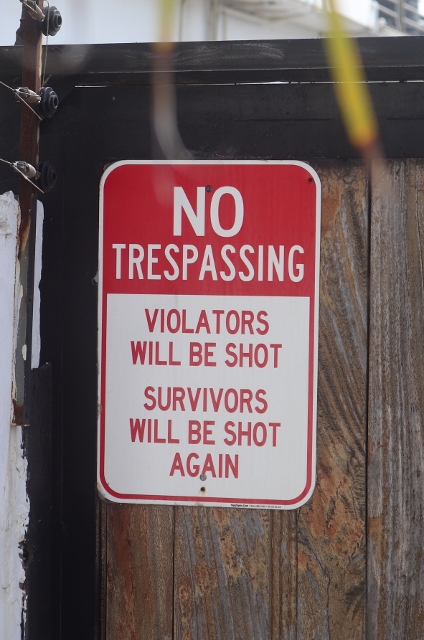
generally West Africans are friendly people, even if this notice we came across in Accra suggests otherwise

